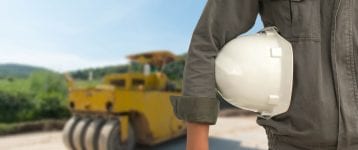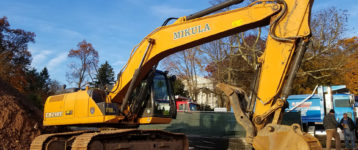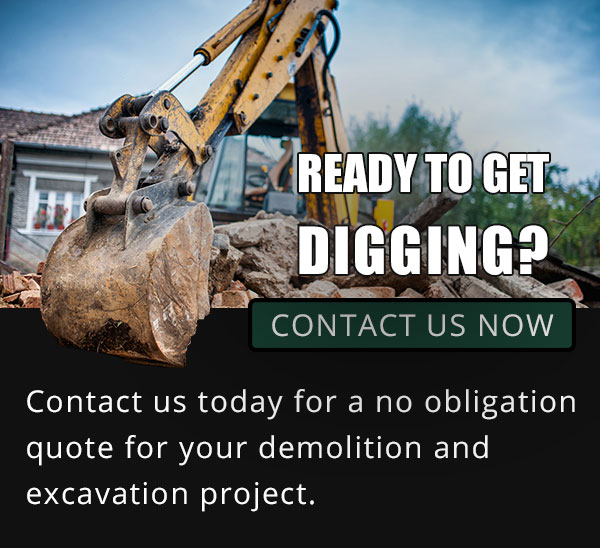At their core, excavation projects come down to a company, its personnel, professionalism, and the excavation equipment. That’s why it’s so vital to have the right tools. In any kind of job or project, having the right tools is essential for success. When it comes to excavation equipment, there is so much at stake for your residential or commercial property that, it could be said, it’s not only the most important thing, it’s the only thing that matters.
Different Types of Excavation Projects
- Rock Hammer – typically done to remove rock from a site. This can be a very time consuming, labor intensive process so the right equipment is needed for this initial loosening of rock.
- Compacting and grading – this is usually done to affect the shape and slope of the land or to increase soil density. The equipment used in this process may include grade trimmers and motor graders.
- Lifting and moving – sometimes, you may need to remove trees, debris, and structures from an area. This also requires disposing of these materials or moving them to another location.
What excavation equipment might be necessary for your project?
Backhoe loader
These have an adjustable shovel in the front and a bucket in the back. It is usually used for medium-sized or smaller jobs. You may typically see this machine moving dirt, placing pipes and performing backfill duties. Its greatest advantage is that it moves on tires, so it can be used in urban areas and for trenches of various widths.
Bulldozer
You can think of this piece of machinery as the monster of the excavation industry. It is one of the strongest and most reliable tools in construction. Powerful and extremely heavy, it runs on treads and has a wide, flat blade in the front. It normally used pushes large piles of dirt or breaks up huge boulders among other duties.
Crawler loader
Combining the track mounted power of an excavator with the bucket capability of a backhoe; this machine is most helpful for moving materials off-site. You may often see them loading material into a truck or taking soil to a different location.
Excavator
This is the machine most often associated with excavation projects. It has a long bucket arm attached to a cab where the operator sits and can rotate 360 degrees. Running on tracks, this is a large piece of equipment used for big jobs. It is typically used to dig trenches, demolition, snow and forestry removal, lift pipes and heavy objects, and grade the ground. You can also use different attachments for them, such as a clamshell attachment to pick up dirt and debris. There are several types of excavators, including:
- Spider excavator – designed to work on all types of terrain, such as steep inclines and narrow ditches, it moves on “legs” instead of tracks.
- Swamp excavator – specially made for jobs near water, it has a special kind of track that makes it perfect for dredging projects.
- Zero swing excavators – this machine has an arm that can only swing within its own width, making it the perfect piece of excavation equipment for confined spaces.
Skid-steer loader
Simple to operate, these machines are quite flexible with a tight turning radius like a military tank. This makes it ideal for small spaces and in areas with numerous structures around or other completed excavation projects. It has wheels for better traction in mud and snow and reduced soil compaction.
Trencher
You will find trenchers of many sizes and capabilities, such as walk-behind models and heavy trenching varieties. It operates with a conveyor system that takes the excavated material and moves it to an area next to the trench. There are different digging tools, depending on the type of excavation required and how hard the excavated material will be. You can find both wheeled and chain trenchers. For example, a professional might use it to dig up pavement or asphalt. They are most often used for drainage purposes, or laying pipes and cables. The right excavation equipment can prevent dangers like cave-ins.
No matter what type of excavation equipment you have, you will need professionals who possess the skill and experience to use them correctly. It also must have the features and attachments you need to get the job done. In addition, it’s vital that your equipment be in excellent working condition with no leaks or excessive smoke. Make sure that all equipment receives regular testing to avoid accidents, delays, and costly repairs.
Not having the right excavation equipment can impede the progress of your project. Over time, if you can’t complete jobs in a timely fashion, you will lose customers and maybe even your business. There is constant pressure to decrease costs and increase productivity. By reducing small equipment and project deficiencies, you can achieve big results.
What you need to consider when deciding on the right excavation equipment
1. Your site
Large areas require the most powerful excavation equipment. Also, flat landscapes have different needs than uneven urban areas.
2. Your job
Is this just a quick operation or will you need to prepare for the long haul? Are there lots of hazards and different phases for your project? What you need for digging, lifting, and carrying may be dissimilar from the tools needed to dredge or avoid nearby obstacles.
3. The comfort and skill of the operator
Never forget the person actually operating the excavation equipment. If this person seems uncomfortable or does not have the tools he needs, the job goes undone. Make sure that the seats provide flexibility, the temperature of the cab is adjustable and the controls are easy and sensible. You will get better performance and results when these aspects are in place.
Excavation projects take experience and training. Mikula Contracting handles foundation and construction excavation as well as rock removal and trench excavation. You can trust us for all your excavation needs. We service Essex, Passaic, Hudson, Bergen, Union, and Morris counties. Call today for a fast quote!



